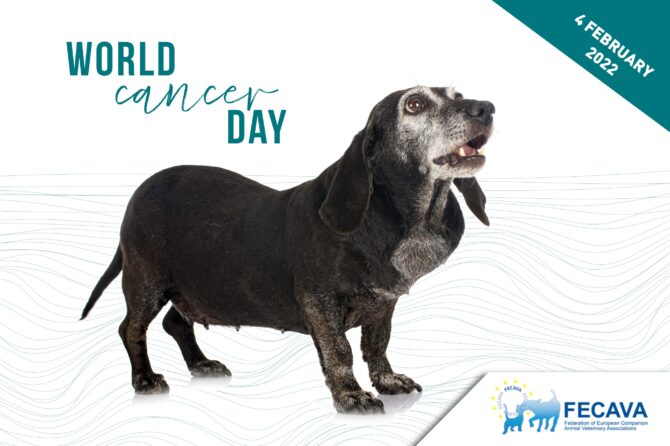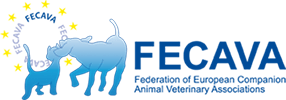
World cancer day: Almost half of the dogs over the age of 10 will develop cancer
On February 4, the world comes together to raise awareness, improve education, and inspire action to combat cancer.
We will dedicate this year’s World Cancer Day to the latest news in the field of veterinary oncology. Hopefully, you’ll find some of this information useful and will be able to incorporate them into your clinical practice.
The World Small Veterinary Association Oncology Working Group (WOW) was established in 2021 to raise awareness of the most recent advances in cancer therapy in veterinary oncology and to promote best practices worldwide. The WOW mission is to help overcome the asymmetric degrees of regional veterinary oncology development and resource limitations, improve awareness, communication, and vigilance for our global community and our pet parents.
- Almost 2,000 veterinary professionals from around the world, 95% of them veterinarians, completed the WOW Group survey in ten languages, during September and October 2021. The results will help the group prioritize its efforts to educate and support WSAVA members globally in raising standards of care for veterinary oncology patients. Take a look at the highlights of the results HERE.
- Cancer can be a complex disease with a language all of its own. To help with understanding and communication, the WOW Group has created a glossary of commonly used terms, and how they specifically relate to veterinary oncology. Access it on the link HERE.
In 2021, several interesting studies have been published. Here are some of them:
- De Ridder T, Reddell P, Jones P, Brown G, Campbell J. Tigilanol Tiglate-Mediated Margins: A Comparison With Surgical Margins in Successful Treatment of Canine Mast Cell Tumours. Front Vet Sci. (2021)
Tigilanol tiglate (TT) is a novel small molecule registered as a veterinary pharmaceutical for intratumoural treatment of canine mast cell tumours (MCTs). The aim of the study is to help clinicians to conceptualize tissue deficits formed following tumour destruction by TT relative to surgical excision.
- da Cruz, I.C.K., Carneiro, R.K., de Nardi, A.B. et al. Malignancy prediction of cutaneous and subcutaneous neoplasms in canines using B-mode ultrasonography, Doppler, and ARFI elastography. BMC Vet Res 18, 10 (2022)
Cutaneous and subcutaneous neoplasms are highly prevalent in dogs, ranging from benign to highly aggressive and metastatic lesions. The aim of this study was to verify the accuracy of B-mode ultrasonography, Doppler, and ARFI elastography to predict malignancy in cutaneous and subcutaneous canine neoplasms.
- Riondato F, Comazzi S. Flow Cytometry in the Diagnosis of Canine B-Cell Lymphoma. Front Vet Sci. (2021)
B cell lymphoma (BCL) is a heterogeneous group of lymphoid malignancies which comprise the majority of canine lymphomas. This review aims to explore the use of flow cytometry to refine the diagnosis of canine BCL.
- Kim C, Wouda RM, Borrego J, Chon E. Cyclophosphamide rescue therapy for relapsed low-grade alimentary lymphoma after chlorambucil treatment in cats. J Feline Med Surg. (2021)
The aim of this study is to evaluate the response, outcome and prognostic factors in cats with clinically presumed relapsed low-grade alimentary lymphoma (LGAL) receiving cyclophosphamide as a first-line rescue therapy after failing chlorambucil treatment.
- Freytag JO, Queiroz MR, Govoni VM, Pereira IVA, Pulz LH, de Francisco Strefezzi R, Queiroga FL, Cogliati B. Prognostic value of immunohistochemical markers in canine cutaneous mast cell tumours: A systematic review and meta-analysis. Vet Comp Oncol. (2021)
Histological grading systems remain cornerstones in the prognosis of canine cutaneous mast cell tumours (MCTs), but the distinct biological behaviour of each tumour often necessitates the use of complementary markers. This systematic review and meta-analysis was designed to establish which immunohistochemical markers have verifiable prognostic value for cutaneous MCTs in dogs.
European Society of Veterinary Oncology (ESVONC) was established 30 years ago by a group of scientists, active in the field of veterinary and comparative oncology. Here is their web site and FB page.
Each year, they present state-of-the-art scientific programs at their annual congress. You can check the upcoming ESVONC congress (26-28 May 2022) preliminary program HERE.
ONCOWAF is a webpage dedicated to pet owners providing concrete and independent answers about what cancer means in dogs and how one can deal with this. Oncowaf is an initiative of Laetitia Cicchelero, a veterinarian from Belgium with a passion for (research in) oncology.
Leave a reply

Leave a reply